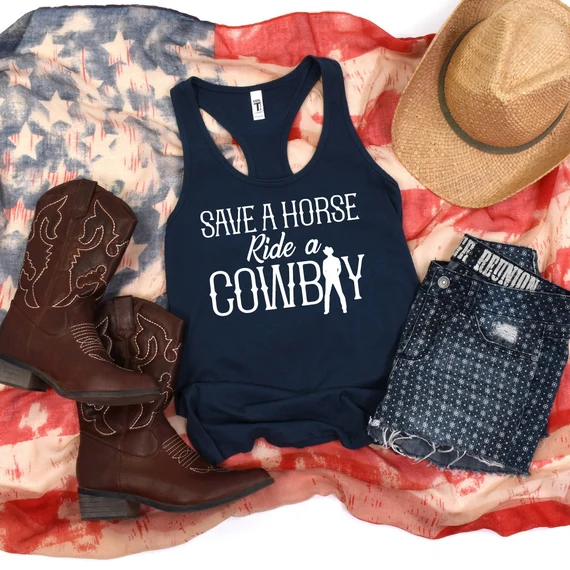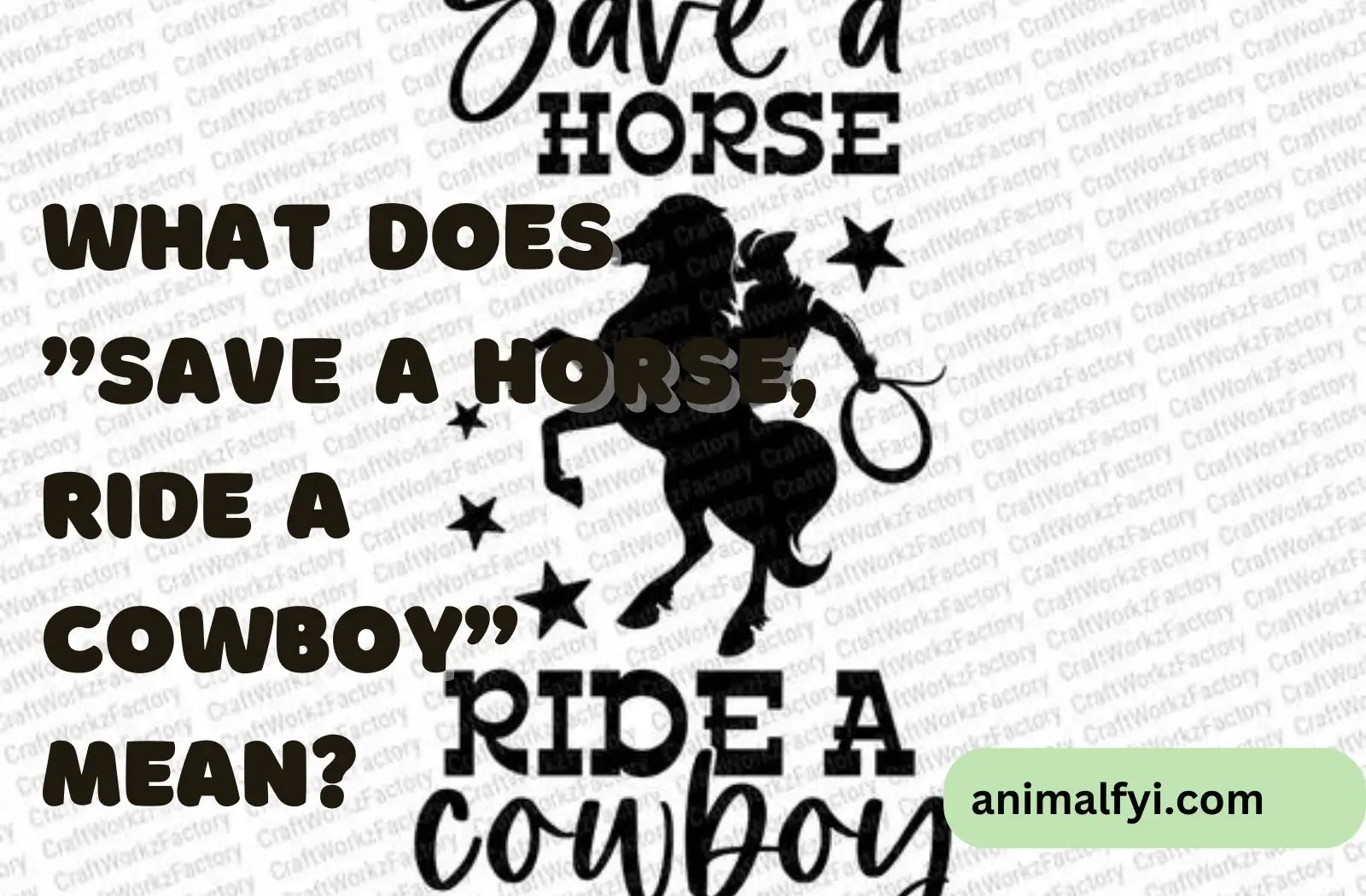“Save a horse, ride a cowboy” is a phrase that has gained popularity, particularly in American country music. Originating from the lyrics of the hit song by Big & Rich, it has sparked curiosity and interpretation. In this comprehensive guide, we will explore the meaning and cultural significance behind the phrase. From its origins in country music to its impact on popular culture, we will delve into the varied interpretations and controversies surrounding this catchy saying.
Origin and Cultural Context
The phrase “Save a horse, ride a cowboy” traces its roots back to the American country music scene. It gained significant recognition through the release of Big & Rich’s debut album, “Horse of a Different Color,” in April 2004. The song of the same name quickly became popular, attracting attention with its catchy lyrics and energetic performance. The phrase’s connection to cowboy culture, freedom, and the imagery associated with the American West added to its appeal and resonance.
Interpretations and Meanings
“Save a horse, ride a cowboy” can be interpreted both literally and symbolically. On a literal level, the phrase can be seen as a playful innuendo, suggesting an alternative mode of transportation with a cowboy in place of a horse. This interpretation adds a hint of humor and flirtation to the phrase. Symbolically, the saying represents a carefree and adventurous approach to life, encouraging individuals to embrace excitement, enjoy experiences, and live life to the fullest.
Impact and Controversy
The phrase “Save a horse, ride a cowboy” quickly gained popularity and became a cultural phenomenon. It garnered attention not only within the country music genre but also in mainstream media. However, the phrase has not been without controversy. Critics argue that it objectifies both horses and cowboys and perpetuates gender stereotypes. The sexually suggestive nature of the phrase has also been a point of concern. These criticisms highlight the need for thoughtful discussions about the appropriateness and implications of such language in popular culture.
Evolving Interpretations and Adaptations
Over time, the phrase “Save a horse, ride a cowboy” has been adapted and used in various contexts beyond country music. It has made appearances in popular culture, advertisements, and parodies. Some reinterpretations of the phrase focus on women empowerment and inclusivity, reclaiming the saying and transforming it into an expression of confidence and empowerment.
Understanding Cowboy Culture
To fully grasp the meaning of “Save a horse, ride a cowboy,” it is essential to appreciate the cultural context surrounding cowboy imagery and its significance in American history. Cowboys evoke a sense of adventure, freedom, and rugged individualism. While popularized through movies, literature, and music, it is important to distinguish between the romanticized stereotypes and the reality of cowboy culture, which encompasses a rich heritage and a deep connection to the American West.
What does “Save a horse, ride a cowboy” meaning?

The phrase “Save a horse, ride a cowboy” carries both literal and symbolic meanings. Literally, it suggests an alternative mode of transportation by replacing a horse with a cowboy, alluding to a playful innuendo or sexual connotation. Symbolically, the phrase represents a carefree and adventurous approach to life. It encourages individuals to embrace excitement, enjoy experiences, and live life to the fullest, often associated with the image of a cowboy representing freedom, confidence, and a sense of adventure.
How to respond when someone says “Save a horse, ride a cowboy”?
When someone says “Save a horse, ride a cowboy,” the response may vary depending on the context and the relationship with the person making the statement. It is essential to consider the intent behind the remark and the comfort level of those involved. Some possible responses could include:
- Playful response: Engage in lighthearted banter or reply with a similarly humorous remark that keeps the conversation light and fun.
- Ignoring the comment: If the statement makes you uncomfortable or is not in line with your values, you can choose to ignore or redirect the conversation to a different topic.
- Open discussion: If appropriate and comfortable, you can engage in a conversation about the meaning, origins, or cultural significance of the phrase, expressing your thoughts and concerns.
Ultimately, the response should align with your personal boundaries, values, and the dynamics of the situation.
What does it mean when you call someone a cowboy?
When you call someone a “cowboy,” it can carry different meanings depending on the context. Traditionally, a cowboy refers to a person who works on a ranch, herding cattle, riding horses, and performing various tasks associated with livestock management. In this sense, calling someone a cowboy can connote qualities such as ruggedness, self-sufficiency, and expertise in horsemanship.
Figuratively, referring to someone as a cowboy may imply characteristics beyond their occupation. It can signify traits like bravery, independence, or even a willingness to take risks. Calling someone a cowboy can also be used as an endearing term to describe their adventurous spirit, free-spirited nature, or ability to handle challenging situations with confidence and resourcefulness.
The meaning behind calling someone a cowboy can vary depending on the context, cultural references, and the intentions of the speaker.
What does “ride ’em cowboy” mean?
“Ride ’em cowboy” is a phrase often associated with the cowboy culture and rodeo events. It is typically used as an exclamation or encouragement to cheer on participants, particularly in rodeo competitions where riders attempt to stay on bucking broncos or bulls for as long as possible. The phrase signifies support, enthusiasm, and admiration for the rider’s skill, courage, and ability to stay mounted on the animal. “Ride ’em cowboy” is an expression that embodies the spirit of the American West, cowboy lifestyle, and the excitement of rodeo events.
Read: What Does It Mean to Hamstring a Horse?
Read: How Big is a Horse’s Brain?
Read: Can Horses Eat Blueberries?
Read: When to Euthanize a Horse with Cushing’s?
Conclusion
In conclusion, “Save a horse, ride a cowboy” emerged as a memorable phrase within the American country music scene. Its meaning can be understood both literally and symbolically, with interpretations ranging from playful innuendo to embracing a carefree approach to life. While the phrase has faced controversy and criticism, it has undeniably made a significant impact on popular culture. By understanding its origins, varied interpretations, and cultural significance, we can engage in meaningful discussions about language, gender representation, and the evolving nature of expressions within music and beyond.

